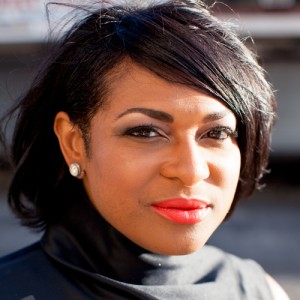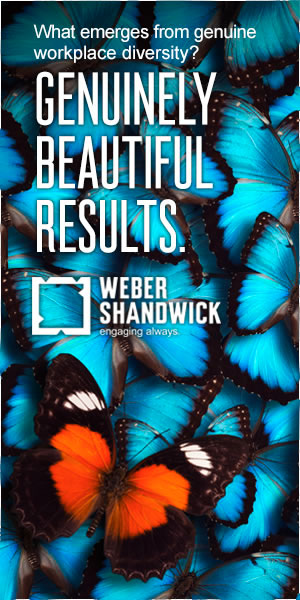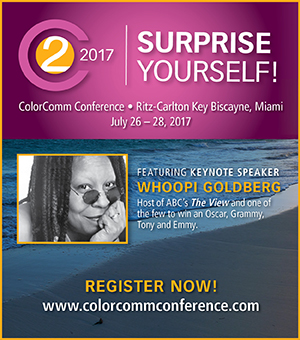Vida Cornelious, the EVP and Chief Creative Officer, at the multicultural agency, Walton Isaacson has led her team to two business wins adding an incremental $10MM in agency billings.
DIVERGE talked to Cornelious about the importance of diversity, multicultural agencies, her favorite work, and more.
Why are multicultural agencies so important?
Multicultural agencies bring a deep strategic and creative understanding of diverse audiences to the marketplace.
They understand the daily nuances in diverse lives whereas this can be a challenge for those who have not had that personal journey.
Being a diverse individual, why is it important to see diversity in top management?
Diverse voices need to be at the table offering different points of view and personal experience. Corporations and agencies need diverse decision-makers not just quota fillers in the mailroom or at their reception desks. If you don’t have more diverse senior leaders at the table when decisions are being made, how do you know you are making the correct decision or a decision that could cost you business, customers and your reputation?
Why do you think clients are attracted to multicultural agencies?
Marketers recognize the need to understand all of the consumers they want to reach. There is a business objective in seeing the potential in capturing the multicultural market. But in order to create genuine brand love and connectivity, they need to first make sure they have full awareness of who this consumer is and how best to reach them. Multicultural agencies can be better equipped to deliver on that ask.
What are some of your favorite campaigns that involve different cultures?
I really love The Bell’s Lager spot out of South Africa to promote adult literacy. The work from David for Coca-Cola out of Latin America is very well done and insightful. I love the work from CoorDown in representation of the Downs Syndrome/People with Disabilities community and the insight they uncovered to do that thoughtful work.
What qualities do you look for when hiring for your team?
I look for individuals who have an overall, unapologetic curiosity about the world and how people respond to it. I look for strategic-minded creatives. Critical thinkers. People who like to solve problems. Solution finder people. I look for glass half full people not half empty people.
Where do you get your best ideas?
Believe it or not, I get some of my best ideas…. By GOOGLING. And I say that because as a creative person, and a naturally curious person if I want to know about a topic, I Google–just like the rest of the world does. But typically you find the truth, and insights about anything you are looking for in the comments. We aren’t afraid to be harsh, or vulnerable, or outspoken or opinionated on the web. We can hide behind an anonymous comment or username. But people typically respond to things that strike a chord in them. And sometimes in reading those comments, or watching the videos someone posts is far more telling than any research document. I find a great deal of pleasure in discovering how someone thinks or walking in their shoes because of what they have shared. There is culture, but the context around culture is what human voices & thought adds to give you deeper understanding.
Which campaign of yours are you most proud of?
I am very proud of the current work I’ve done for Lexus and the LGBT audience. This longer form web content is allowing us to have very authentic conversations with that audience on behalf of the brand. The first installment of the series, Inside Out, was named one of the best LGBT ads of the year in 2015. The second installment, Icons & Ingénues is launching now and I hope will have the same response.
What was your favorite part about the panel you were on at the 3 Percent Conference?
What I loved about the panel is that we do have to remember and encourage our clients to make their work count. The fragmented media marketplace is the new reality, which means consumers can interface with a brand on their own terms. So brands need to be more authentic & transparent than ever.
They cannot afford to simply ignore the cultural nuances, drivers, insights of the consumers they are hoping to reach, and sometimes ad dollars have to go toward messages that are not about “selling to” but “connecting with” consumers.
I also love that the 3% Conference gives all of its panelists an opportunity to affirm why diversity and equality is so important. Because we are all champions for the mosaic…of unique points of view and voices in the room.
Overall, why are conferences that focus on diversity/equality important?
We, as a culture are not a monolith so our corporate workspaces need to reflect that. Women’s voices, people of color’s voices, LGBT voices all need to be valued in order to get the best, most truthful innovative ideas out in the world. My story, (like so many other diverse individuals) is a series of unique experiences. Each one informs how I interface with the world, process and synthesize information that is presented to me. And because of that fact, my response to that information will always have a point of difference. It’s time we all see there is value in that.
Why are multicultural agencies so important?
Multicultural agencies bring a deep strategic and creative understanding of diverse audiences to the marketplace.
They understand the daily nuances in diverse lives whereas this can be a challenge for those who have not had that personal journey.
Being a diverse individual, why is it important to see diversity in top management?
Diverse voices need to be at the table offering different points of view and personal experience. Corporations and agencies need diverse decision-makers not just quota fillers in the mailroom or at their reception desks. If you don’t have more diverse senior leaders at the table when decisions are being made, how do you know you are making the correct decision or a decision that could cost you business, customers and your reputation?
Why do you think clients are attracted to multicultural agencies?
Marketers recognize the need to understand all of the consumers they want to reach. There is a business objective in seeing the potential in capturing the multicultural market. But in order to create genuine brand love and connectivity, they need to first make sure they have full awareness of who this consumer is and how best to reach them. Multicultural agencies can be better equipped to deliver on that ask.
What are some of your favorite campaigns that involve different cultures?
I really love The Bell’s Lager spot out of South Africa to promote adult literacy. The work from David for Coca-Cola out of Latin America is very well done and insightful. I love the work from CoorDown in representation of the Downs Syndrome/People with Disabilities community and the insight they uncovered to do that thoughtful work.
What qualities do you look for when hiring for your team?
I look for individuals who have an overall, unapologetic curiosity about the world and how people respond to it. I look for strategic-minded creatives. Critical thinkers People who like to solve problems. Solution finder people. I look for glass half full people not half empty people.
It is very important to me that when working creatively, you have to have to be able to summon your inner optimist. If you cannot ask yourself “what if?, “ then you are cutting yourself off from creative possibility. So it is imperative people on my team be able to work past adversity, and get unstuck. I always say “Ideas don’t move unless you do.”
Where do you get your best ideas?
Believe it or not, I get some of my best ideas…. By GOOGLING. And I say that because as a creative person, and a naturally curios person. If I want to know about a topic, I Google–just like the rest of the world does. But typically you find the truth, and insights about anything you are looking for in the comments. We aren’t afraid to be harsh, or vulnerable, or outspoken or opinionated on the web. We can hide behind an anonymous comment or username. But people typically respond to things that strike a chord in them. And sometimes in reading those comments, or watching the videos someone posts is far more telling than any research document. I find a great deal of pleasure in discovering how someone thinks or walking in their shoes because of what they have shared There is culture, but the context around culture is what human voices & thought adds to give you deeper understanding.
Which campaign of yours are you most proud of?
I am very proud of the current work I’ve done for Lexus and the LGBT audience. This longer form web content is allowing us to have very authentic conversations with that audience on behalf of the brand. The first installment of the series, Inside Out, was named one of the best LGBT ads of the year in 2015. The second installment, Icons & Ingénues is launching now and I hope will have the same response.
What was your favorite part about the panel you were on at the 3 Percent Conference?
What I loved about the panel is that we do have to remember and encourage out clients to make their work count. The fragmented media marketplace is the new reality, which means consumers can interface with a brand on their own terms. So brands need to be more authentic & transparent than ever.
They cannot afford to simply ignore the cultural nuances, drivers, insights of the consumers they are hoping to reach, and sometimes ad dollars have to go toward messages that are not about “selling to” but “connecting with” consumers.
I also love that the 3% Conference gives all of its panelists an opportunity to affirm why diversity and equality is so important. Because we are all champions for the mosaic…of unique points of view and voices in the room.
Overall, why are conferences that focus on diversity/equality important?
We, as a culture are not a monolith so our corporate workspaces need to reflect that. Women’s voices, people of color’s voices, LGBT voices all need to be valued in order to get the best, most truthful innovative ideas out in the world. My story, (like so many other diverse individuals) is a series of unique experiences. Each one informs how I interface with the world, process and synthesize information that is presented to me. And because of that fact, my response to that information will always have a point of difference. It’s time we all see there is value in that.


